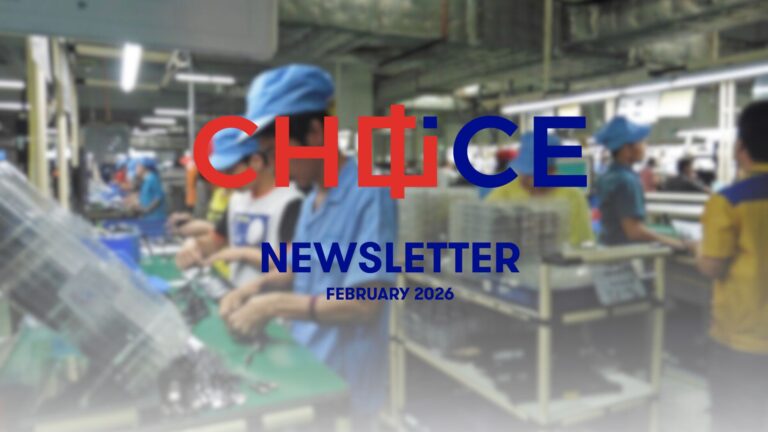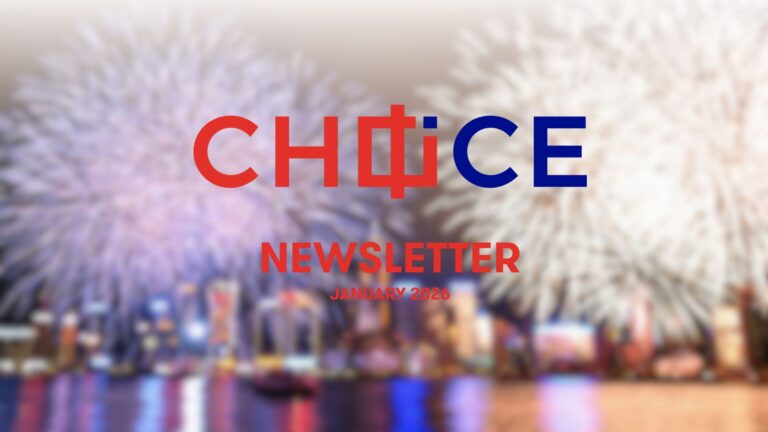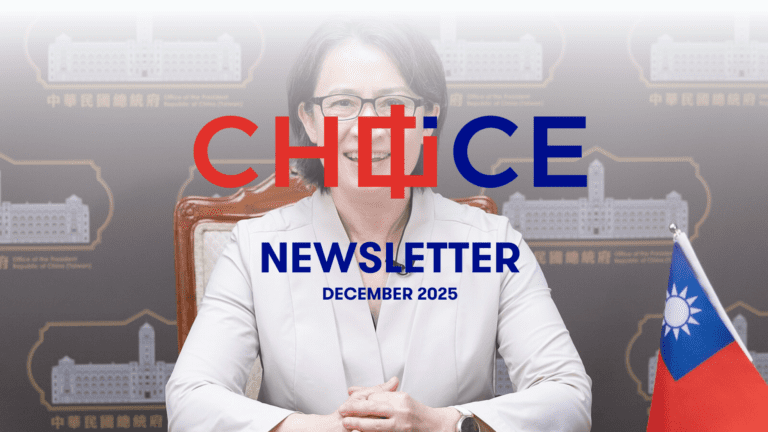CHOICE Newsletter: Trade War and Its Ripples Worldwide
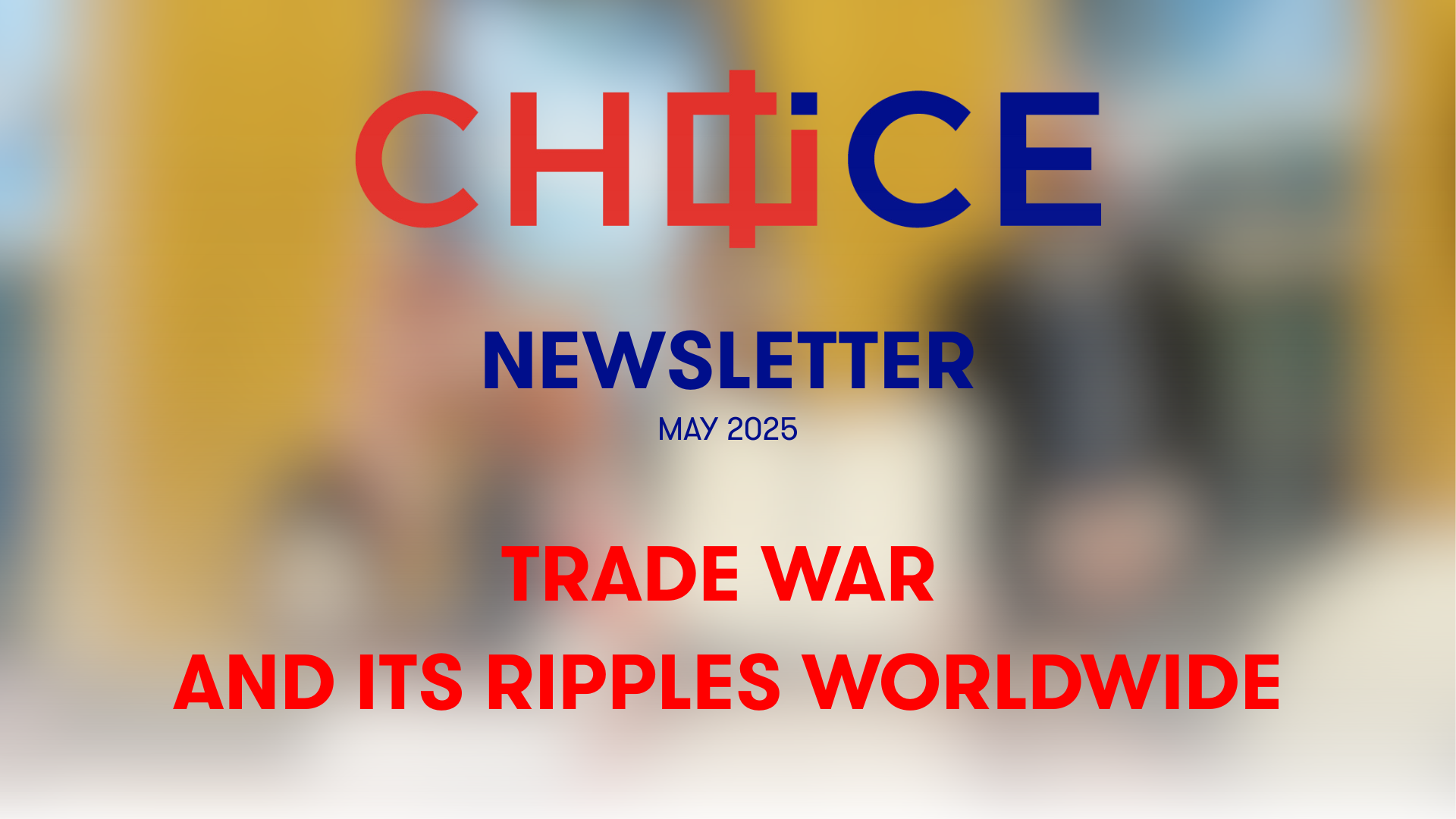
Dear Reader,
The past month has been nothing short of eventful. From Trump’s tariffs to Xi’s charm offensive in Southeast Asia and the growing opportunities for the Czech Republic to play a major role – both in R&D and supply chains – in the EU’s semiconductor efforts, it is a dynamic time on the international stage. As tariffs continue to dominate the headlines, we take a closer look at the US-China trade war and what it means for the EU, especially its Central and Eastern European (CEE) members.
Meanwhile, Taiwan, which has itself been targeted by earlier rounds of Trump’s tariffs, is trying to strengthen its international partnerships. Against this backdrop, we examine the recent passing of Pope Francis and its implications for Taiwan’s relationship with its last official European ally – the Vatican.
On a more positive note, we continue to build our partnerships. We are proud to welcome the Swedish National China Centre (NKK) at the Swedish Institute of International Affairs (UI), as well as the Atlantic Council’s Global China Hub, to our growing network of partner institutions. We are also in the process of finalizing the first joint events and activities with some of our new partners, so stay tuned for updates! Thus we are also seeking new team members to support and strengthen our expanding range of activities. If interested, apply by the end of May here.
CHOICE Take
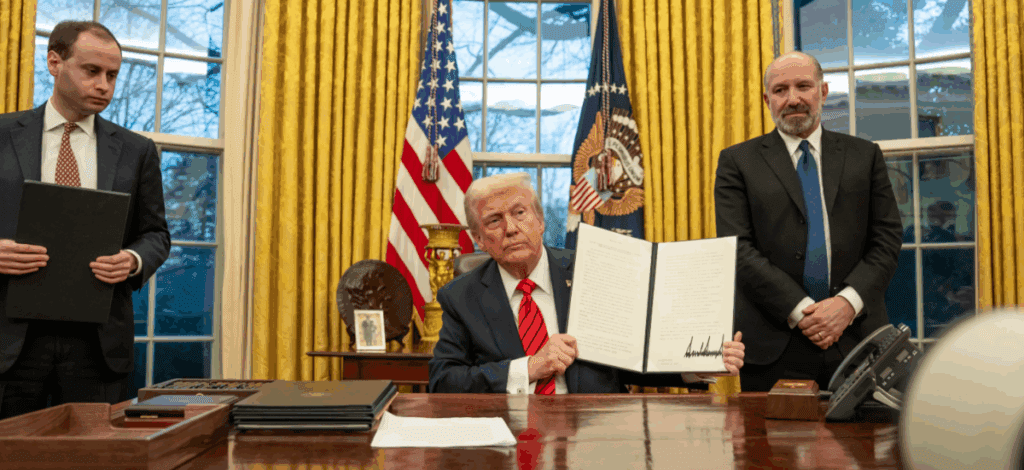
A Fork in the Road? The US-China Trade War and the Future of EU-China Relations
Since Trump’s decision to impose reciprocal and sectoral tariffs on both China and a range of US allies – including Taiwan, Japan, South Korea, and the EU – the world has experienced a rollercoaster ride full of twists and turns in US foreign policy. Most recently, on April 24, news came from the White House that after a 90-day pause on tariffs (excluding those on China) to allow the countries to negotiate deals with the US, Trump is considering the reimposition of reciprocal tariffs, sending mixed signals to US allies across the globe. The messaging between Washington and Beijing has been equally murky, with the Trump administration claiming negotiations are underway and Beijing denying it – though there seems to have been a recent change of mind.
On top of this, Beijing has attempted to capitalize on the shifting landscape through a charm offensive – not only targeting countries in its immediate Southeast Asian neighborhood that have long tried to balance between the two powers, but also the EU.
Against this backdrop, it is important to assess the potential effects of the US-China trade war on the EU and its member states, and whether the unpredictability of US foreign policy provides grounds for considering calls by some European policymakers to strengthen the EU’s relations with China. While the impact of tariffs may indeed be significant in the long-term – restructuring the “free” trade system that has been in place since the end of WWII – several studies suggest that the direct impact on the EU may be less severe than originally feared. In fact, the potential blow could be smaller than to the US, with GDP contractions likely to be less dramatic than those induced by previous external shocks like the COVID-19 pandemic and the Russian invasion of Ukraine. That said, all of this will depend on the final tariff rates, the EU’s response, and the reactions of other US allies.
The impact will also vary by sector and region. For instance, the German – and by extension the Central and Eastern European – automotive industry could be hit particularly hard, as supply chain disruptions may prove more damaging than direct trade impacts. However, this is also one of the sectors where the Trump administration is facing significant domestic pushback, with several reports suggesting that automotive components may join the list of tariff exemptions that already includes semiconductors and raw materials, among other things.
Bruegel further estimates that the anticipated trade diversion from China might be less pronounced than expected, as Chinese exports to the US are largely concentrated in sectors where the EU lacks strong domestic players. At the same time, any further dumping of Chinese EVs on the EU market could backfire, posing a serious threat to the EU’s largest industry. On one hand, a major shift in the EU’s China policy remains unlikely – particularly without substantial Chinese concessions on long-standing EU grievances such as market access, subsidies and a level playing field, not to mention the rising concerns about Chinese overcapacity and export-oriented industrial growth model. On the other hand, recent developments including discussions around replacing tariffs on Chinese EVs with minimum pricing as well as the lifting of sanctions on EU representatives (though not all sanctioned entities), which had previously derailed the EU-China Comprehensive Agreement on Investment (CAI), suggest a modest warming in relations may be on the horizon.
By Dominika Remžová, CHOICE Analyst (based in Nottingham)
Taiwan in Focus
Walking on Eggs: How Taiwan Maneuvers Official and Unofficial Diplomacy
At a time of increasing uncertainty in its relationship with the United States, Taiwan needs all the allies it can get to strengthen credible deterrence in its foreign policy and counter Beijing’s mounting military and other threats. Left with only 12 diplomatic allies, Taipei cannot afford to lose even one more to Beijing.
This likely explains its recent decision not to send President Lai to Pope Francis’ funeral – marking a break from tradition as the Holy See is Taiwan’s only official diplomatic ally in Europe. Lai’s calculation might be that attending could further provoke Beijing at a time when some in the Vatican are pushing for rapprochement with China, where an estimated 10 million Catholics operate in a gray area between an underground Church loyal to the Vatican and an official one aligned with Beijing.
Meanwhile, Taipei and Manila agreed this month to lift a ban on bilateral visits by government officials – except for those occupying the highest positions – signaling a political alignment. Both countries experience daily violations of their maritime territories, with the Philippines facing particularly violent confrontations as their fishing boats clash with Chinese military and border patrol ships on an almost weekly basis.
As Trump’s policies remain as unpredictable as ever – even after Taiwan’s chip giant TSMC offered more guarantees of US investment – Taipei can reasonably rely only on partners in the Indo-Pacific region and Europe. If not militarily, then at least diplomatically.
By Filip Noubel, CHOICE Analyst (based in Taipei)
CHOICE News
 Our sister project MapInfluenCE has released a new paper! In this latest publication, Joanna Nawrotkiewicz explores three cases of Chinese investments in Poland – a port operator, a construction firm, and a scanner company. Her analysis highlights key concerns surrounding Poland’s approach to economic security and its role in the country’s EU Council presidency. (find out more)
Our sister project MapInfluenCE has released a new paper! In this latest publication, Joanna Nawrotkiewicz explores three cases of Chinese investments in Poland – a port operator, a construction firm, and a scanner company. Her analysis highlights key concerns surrounding Poland’s approach to economic security and its role in the country’s EU Council presidency. (find out more)
 We have published our first all-female commentary as part of our Women Insight on China (WiCH) network, featuring contributions from three of our co-chairs, who provide insightful analysis on the topic of US tariffs and their implications for American allies. (read it here)
We have published our first all-female commentary as part of our Women Insight on China (WiCH) network, featuring contributions from three of our co-chairs, who provide insightful analysis on the topic of US tariffs and their implications for American allies. (read it here)
 Our Analyst Dominika Remžová will be representing CHOICE at several academic events, including the British Association of Chinese Studies (BACS) Annual Conference and the Taiwan-Europe Connectivity Workshop at the University of Tübingen’s European Research Center on Contemporary Taiwan (ERCCT).
Our Analyst Dominika Remžová will be representing CHOICE at several academic events, including the British Association of Chinese Studies (BACS) Annual Conference and the Taiwan-Europe Connectivity Workshop at the University of Tübingen’s European Research Center on Contemporary Taiwan (ERCCT).
 Are you a Czech or Slovak speaker? If so, you can tune in to our Lead, Ivana Karásková, who spoke in the Czech national TV’s ČT 90′, where she discussed the impact of tariffs on EU-China relations. (watch it here)
Are you a Czech or Slovak speaker? If so, you can tune in to our Lead, Ivana Karásková, who spoke in the Czech national TV’s ČT 90′, where she discussed the impact of tariffs on EU-China relations. (watch it here)
 Are you going to be in Taipei in the following days? If so, feel free to join Ivana Karásková, AMO China Team Lead and Senior Researcher with Supply Chain Resilience Center (SCRC), for the Chinese Influence in Europe: A View from Prague event in the Czech Hub in Taiwan. Please note that attendance is possible by prior registration only.
Are you going to be in Taipei in the following days? If so, feel free to join Ivana Karásková, AMO China Team Lead and Senior Researcher with Supply Chain Resilience Center (SCRC), for the Chinese Influence in Europe: A View from Prague event in the Czech Hub in Taiwan. Please note that attendance is possible by prior registration only.
 We’re on Bluesky! Stay updated with our latest articles, insights, and news by following our account – don’t miss out on valuable content and updates. (follow us here)
We’re on Bluesky! Stay updated with our latest articles, insights, and news by following our account – don’t miss out on valuable content and updates. (follow us here)
Written by
CHOICE
CHOICE is a multinational consortium of experts providing informed analysis on the rising influence of the People’s Republic of China within the countries of Central and Eastern Europe (CEE).
